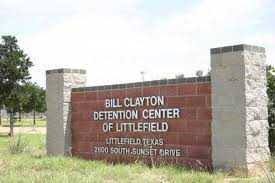A prison by any other name is still a prison
By Sandy . . . They were married in a Texas county jail with a bulletproof pane of glass between them. The paths that took them to that point were twisted and tortuous, and the paths leading from it are even more so.
He was convicted of two sexual offenses many years ago and served two prison terms for them with the Texas Department of Corrections. In 2009 he was transferred to a halfway house and put in the Texas Civil Commitment program, which at that time was an out-patient program. In 2015, the Texas Civil Commitment Center (TCCC) in Littlefield, Texas, opened, a facility—and a program—with a history and performance inspiring anything but confidence and success. He was taken there, grabbed up in a sweep

across Texas by the state D.O.C. that could have been inspired by the pogroms in Nazi Germany that rounded up and removed Jews to concentration camps.
His wife Mandi sounds very matter-of-fact as she speaks about that time. She has told this story often. Mandi was employed from 2018 to 2021 at the Texas Civil Commitment Center—often simply called Littlefield— with a security company that contracted to TCCC. There they met, talked, and eventually the feelings of illicit friendship deepened into romantic ones. Mandi knew that they were breaking the rules, and she was terminated in 2021 on that charge.
New charges were brought against him for possession of contraband—a cell phone— and for failure to report internet identifiers, and he was returned to prison on the contraband conviction. Mandi visited him often there as well as having telephone conversations, and the relationship grew into love. It was while he was being held in a county jail awaiting transfer yet again back to prison for the internet charges that they married in April of 2022.
That was the last time Mandi saw her husband, and the few telephone calls she has been allowed with him since have been with a Littlefield employee on the line and precipitated by her having a serious medical condition.
Detainees at Littlefield—they are not allowed to be called prisoners—are permitted contacts through a laborious and potentially arbitrary process. The detainee initiates the procedure with a request and fills out a form; the next step is an interview with the requested person. The treatment team reviews the request and the recorded interview, and then the head of the treatment team decides the level of contact that will be allowed—mail, phone, or/and in-person visits.
Mandi’s application was stalled at the interview stage. She was not—and still has never been—granted an interview. Instead, her application was denied on the basis of her not being a “pro-social collateral contact” due to her willingness to break the “no fraternization” rule while she was working at Littlefield and her failure to report his illicit cell phone.
She was told in a telephone meeting with Littlefield employees that she would first need to take classes

from an approved, licensed, sex offender treatment provider. So she did, twelve different times, at her own expense. She still was not approved.In an interesting sidenote, information about the requirements of an approved sex offender treatment provider in Texas appears to be swathed in secrecy.
She was then told she had to take approved chaperone classes. She has. Twice. She was still denied.
Then she was told she needed to prepare and submit a “treatment plan.” She has. Several. Every one has been rejected, and she was denied any assistance in what to include or what she was doing wrong. In a telephone meeting early in December of 2023, Mandi was berated and belittled to the extent that she gave up and stopped trying. She later filed suit against the Texas Civil Commitment Office, its executive director, the head of its treatment program, and her husband’s case manager.
Before the end of 2023, Mandi was told by her doctor that tests showed she had a cluster of malignant cervical cells.
She was granted a very short, monitored telephone conversation with her husband to inform him of her diagnosis and the medical procedures she would be undergoing. None of those surgical procedures were successful in eradicating her cancer, and she was told she would need a total hysterectomy.
The request for a telephone call to inform her husband of her impending major surgery was initially denied—the lawsuit had now been served—and then was reluctantly granted, but only because she is her husband’s legal power of attorney. Permission for the call came with a litany of demands:
- Only legal matters could be discussed, nothing medical, nothing about her upcoming surgery.
- The call would, as the previous few calls about her surgical procedures had done, include a Littlefield employee.
- The call could be “absolutely” no longer than five minutes.
- They were forbidden to include any personal references or to say, “I love you,” to each other.
- They were forbidden to pray.
Mandi’s surgery is now behind her, and she has fully recovered. There still has been no contact whatsoever allowed with her husband. Her voice is restrained yet firm and articulate as she speaks. She readily agreed to this interview; she is eager to tell her story to anyone willing to listen.
I asked if she believed the refusal to approve her as a contact for her husband was a result of her fraternization with him when she worked at Littlefield. “At first, yes,” she replied. “I believe that now it’s because of my advocacy.” Her voice was still matter-or-facet while she spoke about the facility itself, its top administrative staff, and the level of care and treatment it provides.
She spoke of food shortages. “I have been told by the wives and mothers of other men that they are fighting for scraps left on trays and are digging in the trash cans.”
Other issues she answered not only by what she has been told but also from what she knows from when she worked there. “Medical care?” I asked. Inadequate; neglectful; medicines not given. During Covid it was horrible.
“Special needs?” After a pause, her voice was, this time, washed over with emotion. “No. One gentleman, Mr. [name withheld] is almost blind; no accommodations are made for him; he gets no help from any employees at all. Wheelchairs are broken and not replaced. Many of the men are elderly. More bottom bunks are needed for those who are unable to climb up; more handicapped pods are needed.”
Forced civil commitment for persons who have completed court-ordered punishment for a criminal conviction is applicable to no classification of crime other than sexual. Currently twenty states have such provisions.
Littlefield staff and administration insist that the men in their facility be called patients or residents, not

prisoners or inmates, but they are involuntarily confined, locked in cells behind high walls topped with razor wire, unable to make a telephone call or receive a letter until the person calling or writing has been put through the full contact vetting process and gained the approval of the head of their specific treatment team.
The focus of such confinement is supposed to be therapeutic, but little evidence exists that Littlefield offers an acceptable level of therapy or treatment. According to the Just Future project, at Littlefield “. . . thirteen people have been fully released from civil commitment from 2016 to present,” and they were released by the courts, not by completing the program.
Complaints against the facility and TCCC are longstanding and have been made by former employees as well as family member of those incarcerated there.
Mandi’s suit, filed pro se, moves slowly through the system. She gave a presentation at NARSOL’s 2023 conference in Houston. She is a past member of TACC, Texas Against Civil Commitment. She helped in starting a current petition calling for an investigation into TCCC.
Now she waits. No visits. No phone calls. No letters. No one helping her.
She waits.


I wanted to extend my thanks to Sandy for reaching out to me and doing this interview. I appreciate the opportunity to share my story.
What an absolute nightmare. The fight for rational registry laws should probably begin here.
Would writing Texas governor Abbott have ANY affect whatsoever in investigating these atrocities? Or will he, like other politicians, turn blind eye and deaf ear to the situation?